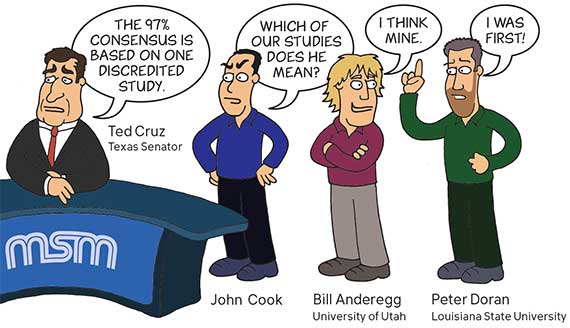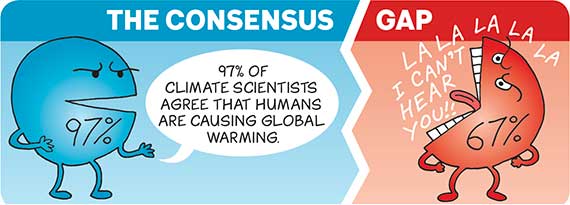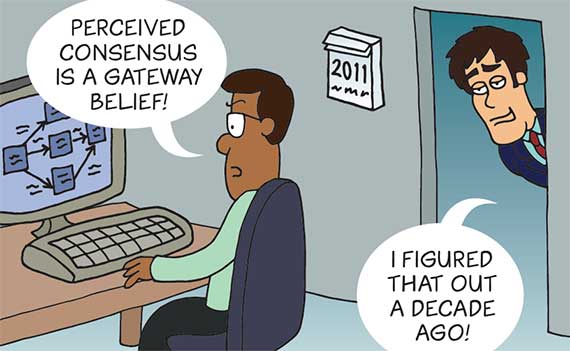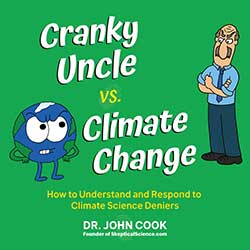
An excerpt from the book Cranky Uncle vs. Climate Change, released Feb 25. First posted here.
A number of studies have quantified the level of scientific agreement on climate change. In 2009, a survey by Peter Doran found that 97.4% of publishing climate scientists agreed that humans were changing global temperature. In 2010, Bill Anderegg analyzed public statements about climate change. He found 97–98% agreement among the most actively publishing climate scientists that humans are causing global warming.
In 2013, I led a team of researchers analyzing 21 years of scientific papers about global warming. Among relevant climate papers, 97% affirmed the consensus. Three different studies all found overwhelming scientific agreement.

The scientific consensus has also been endorsed by many scientific organizations around the world, such as the American Geophysical Union, European Geosciences Union, Royal Meteorological Society, and Australian Bureau of Meteorology. The National Academies of Science from eighty countries have all affirmed human-caused global warming.
Deniers argue that there’s no scientific consensus on climate change because thirty-one thousand science graduates signed a petition rejecting the consensus. This argument appeals to fake experts. The only requirement for the Petition Project is an undergraduate degree in any kind of science. Only 0.1% of the signatories are climate scientists. Asking for nonexpert opinion on a complex topic is like asking a computer scientist to perform heart surgery.

This argument also misleads by using the technique of magnified minority. More than 10 million people have earned a science degree since 1971. That means that only 0.3% of Americans with science degrees signed the petition.
Citing thousands of dissenting nonexperts to cast doubt on consensus is an ageold technique, perfected by the tobacco industry in the 1970s.

Climate deniers have been trying to cast doubt on the scientific consensus for decades. Why attack the consensus? Republican strategist Frank Luntz conducted market research and found that people’s opinions on climate policy depended on whether they thought experts disagreed about human-caused global warming. Luntz advised Republican politicians to cast doubt on the scientific consensus.
Decades of misinformation have taken its toll. The public mistakenly think 67% of climate scientists agree on human-caused global warming. The chasm between public perception and the 97% consensus is known as the consensus gap.

Over a decade after Luntz’s insight, social scientists began researching how people think about consensus. They identified that public perception of consensus is a “gateway belief.” Once people understand that there’s scientific consensus, they’re more likely to accept that climate change is happening and requires action. Social scientists recommended that scientists should communicate the overwhelming expert agreement on human-caused global warming to correct the misconception that scientists disagree.

Communicating the 97% consensus has begun to undo the damage of misinformation campaigns. Over the last 5 years, public awareness of the scientific consensus has steadily increased.
This has led to a new argument from the same deniers who have claimed there is no consensus: now they argue we shouldn’t talk about consensus. Deniers want to convince the public that experts not only disagree on climate change but also stop scientists from clearing up this misconception.

The case for human-caused global warming isn’t based on the 97% consensus; it’s based on scientific evidence. Nevertheless, the public often rely on expert opinion to guide their views on complicated topics like climate change. This is why deniers target expert agreement and why it’s important to communicate the 97% consensus among climate scientists.
 Cranky Uncle vs. Climate Change uses cartoons, climate science, and critical thinking to make sense of climate denial and misinformation. Guided by psychological research into how to refute misinformation, the book embraces a creative approach, using cartoons and visual analogies to make the science engaging and accessible to readers. The book is written and drawn by John Cook, a former cartoonist who now researches climate communication at George Mason University. Cranky Uncle vs. Climate Change will be published by Kensington Books on Feb 25. Sign up for latest Cranky Uncle news at crankyuncle.com.
Cranky Uncle vs. Climate Change uses cartoons, climate science, and critical thinking to make sense of climate denial and misinformation. Guided by psychological research into how to refute misinformation, the book embraces a creative approach, using cartoons and visual analogies to make the science engaging and accessible to readers. The book is written and drawn by John Cook, a former cartoonist who now researches climate communication at George Mason University. Cranky Uncle vs. Climate Change will be published by Kensington Books on Feb 25. Sign up for latest Cranky Uncle news at crankyuncle.com.
Posted by John Cook on Tuesday, 18 February, 2020
 |
The Skeptical Science website by Skeptical Science is licensed under a Creative Commons Attribution 3.0 Unported License. |